
There are several different ways to replace all of your missing teeth
What are my options if I lose all of my teeth?
There are several different options depending on your time and budget. Treatment options may involve dentures, dental implants, or a combination of the two:
- No treatment
- Full dentures/ complete dentures
- Overdentures/ snap-on-dentures/ Snap-on-dentures
- All-on-four/ All-on-five/ All-on-six dental implants
- Full mouth dental implants
FULL MOUTH TEETH REPLACEMENT OPTIONS
| Treatment Options | Pros | Cons |
| No treatment | – Free! | – Poor aesthetics – Risk of choking on food – Malnutrition – Slurred speech – Digestive issues – Other medical problems resulting from malnutrition and incomplete digestion |
| Full dentures | – Inexpensive – Quick and easy – Works well for some people | – Inability to wear dentures – Looseness and mobility – Sore lesions – Reduced taste due to coverage of gum tissues – Compromised chewing ability – Frequent do-overs indicated – Breaks easily and can also get lost |
| Overdentures | – More stable than full dentures – Relatively affordable – Added security & stability – Supporting implants last a lifetime, even if the overdenture doesn’t | – Removable teeth – Arcylic teeth that stain and wear out – May not be as tight as you’d hope – Becomes loose over time and requires maintenance – Covers a large portion of gums and impacts taste and chewing |
| All-on-4 dental implants | – Excellent results – Full chewing ability – High-impact resin, porcelain, or zirconia teeth look great and last forever – Fixed teeth don’t move – Your gums are not covered so you can taste food better | – Very expensive – Takes months or years to complete treatment – Few dentists offer this treatment – Must find a great dentist to get equally great results |
| Full mouth dental implants | – Excellent results – Maximum chewing ability – Top-notch treatment – Porcelain or zirconia teeth look great and last forever – Fixed teeth don’t move – Your gums are not covered so you taste food better | – Very, very expensive – Typically requires extensive bone grafting and sinus surgery in preparation – Treatment usually takes years – Very few dentists offer this treatment – Must find a great dentist that offers this treatment |
Option 1: No Treatment
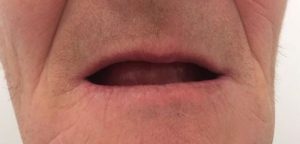
You run the risk of choking on your food without any teeth in the mouth
Some people choose to live without any teeth after they lose all of them. These people chew with their gums, a process that is known as gumming. As you'd imagine, we advise against remaining toothless. Chewing with your gums is inefficient and dangerous. You won't be able to digest food adequately and obtain proper nutrition. You probably won't be able to speak comfortably and intelligibly either. You may lose substantial weight and face serious medical issues down the line. Finally, you run the risk of choking on your food. In fact, there have been several documented cases of people fatally choking on their meals while gumming their food. Therefore, you should consider some sort of tooth replacement option as opposed to remaining completely toothless.
Option 2: Full Dentures
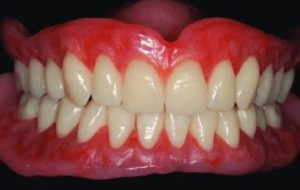
Full dentures are the most affordable way to replace all of your missing teeth
The most affordable way to replace all of your missing teeth is to wear full dentures. Full dentures, also known as complete dentures, replace all your teeth with a set of removable false teeth. How well you function with full dentures varies from patient to patient. Some denture wearers do very well with their false teeth. They eat a fairly regular diet and hardly miss their original teeth. Others struggle daily with wearing their false teeth. They find themselves using more and more denture glue without being able to eat, chew, or speak comfortably. This may be due to a lack of sufficient jawbone, poor musculature control, gag reflex, and other variable factors. For this latter group, we recommend that you look into tooth replacement options involving dental implants. There are three options for completely toothless individuals that involve dental implants: (a) overdentures, (b) all-on-four dental implants, and (c) full mouth dental implants. Continue reading to learn more about treatment options involving dental implants.
Click here to learn more about dentures click here.
Option 3: Overdentures/ Snap-on-Dentures/ Implant-Supported Dentures
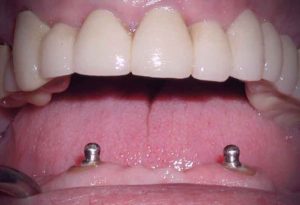
Overdentures replace your missing teeth using a combination of dental implants and dentures
Overdentures replace your missing teeth using a combination of dental implants and denture teeth. Overdentures, also known as snap-on-dentures or implant-supported dentures, offers an affordable way to improve the fit of your false teeth without having to spend a fortune. By adding just two to four dental implants per arch, you can improve the fit and stability of your denture. These dental implants will support your denture to make it more stable and secure. As a result, you can chew better, feel more comfortable, and have a better overall denture-wearing experience.
While overdentures may be a great option for many people, they don't work for everyone. Despite their added stability, overdentures are still removable teeth. This means that you'll be wearing false teeth that go in and out of your mouth. Additionally, overdentures are made from the same acrylic as regular dentures. This means that they break relatively easily and require replacement over time. Finally, overdentures, just like any other denture, feel bulky and dig into your gum tissue. If you're not happy with the idea of having removable, you should explore either all-on-four dental implants or full mouth dental implants.
To learn more about implant-supported dentures click here.
Option 4: All-on-4/ All-on-5/ All-on-6 Dental Implants
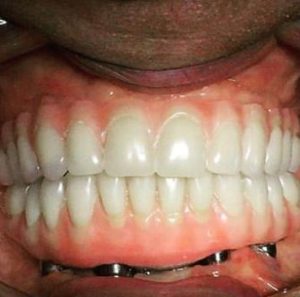
All-on-four teeth are beautiful, strong, and natural-looking
All-on-four dental implants replace all of your missing teeth with a fixed, permanent prosthesis supported by dental implants. A full set of teeth is anchored to as little as four dental implants, although it is not uncommon to use five or six implants as well. All-on-four dental implant treatment gives you teeth that are fixed and permanently locked in place. You can eat, speak, and function as if you had your original teeth back. While expensive, all-on-four teeth offer the best solution for those looking for fixed, beautiful, and durable teeth that last a lifetime.
To learn more about all-on-4 teeth click here.
Full Mouth Dental Implants
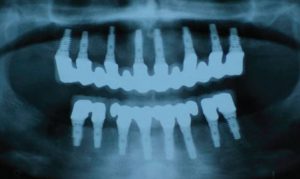
Full mouth dental implant is much more difficult and costly than all-on-four dental implants
The final way to replace all of your teeth is with full mouth dental implants. Typically, you require anywhere between 6 to 12 individual dental implants per arch for this treatment. Additionally, most people require extensive bone augmentation to prepare for implant placement. Once healed, the implants are restored using porcelain or ceramic crowns and bridges. This is a very complex and time-consuming process. Full mouth dental implant treatment takes much longer and costs significantly more than all-on-four teeth do. This is why full mouth dental implants are much less commonly used. They are reserved for cases where the addition of a few dental implants is justified for one reason or another (such as a heavy bite, high cosmetic demand, gummy smile, etc.)
To learn more about full mouth dental implants click here.
Which option is the best one for me?
We discussed the five different treatment options for individuals who have lost all of their teeth. Each option offers its own advantages and disadvantages. For example, full denture treatment is simple, quick, and inexpensive. However, you may end up being uncomfortable and disliking your dentures. On the other hand, all-on-four teeth and full mouth dental implants offer permanent teeth that are stable and durable. However, these treatments take a long time and are very expensive. Talk to your dentist about the different treatment options to see which one works best for you and your mouth.
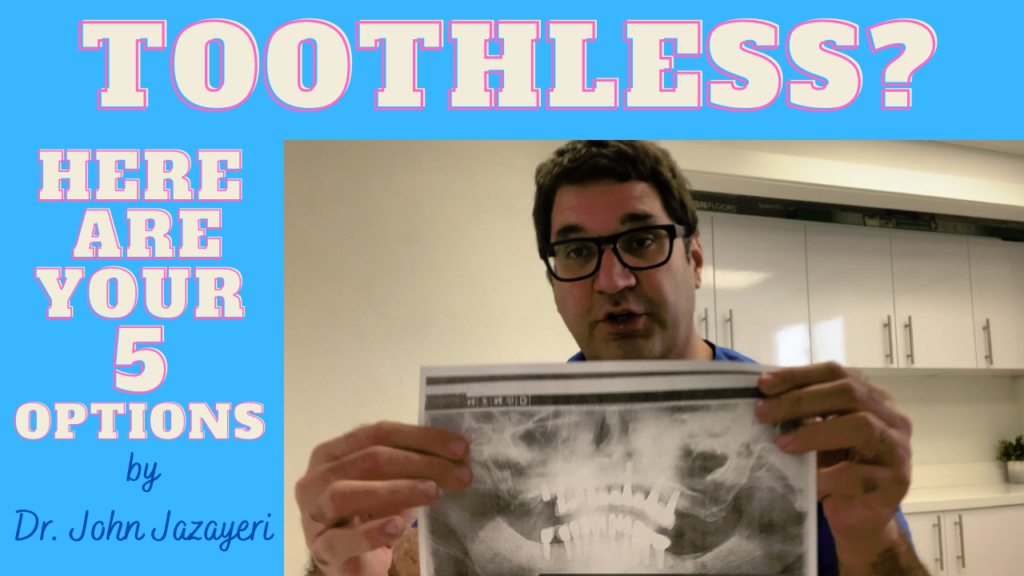
0 Comments